The AMD 3rd Gen Ryzen Deep Dive Review: 3700X and 3900X Raising The Bar
by Andrei Frumusanu & Gavin Bonshor on July 7, 2019 9:00 AM EST** = Old results marked were performed with the original BIOS & boost behaviour as published on 7/7.
Benchmarking Performance: CPU Rendering Tests
Rendering is often a key target for processor workloads, lending itself to a professional environment. It comes in different formats as well, from 3D rendering through rasterization, such as games, or by ray tracing, and invokes the ability of the software to manage meshes, textures, collisions, aliasing, physics (in animations), and discarding unnecessary work. Most renderers offer CPU code paths, while a few use GPUs and select environments use FPGAs or dedicated ASICs. For big studios however, CPUs are still the hardware of choice.
All of our benchmark results can also be found in our benchmark engine, Bench.
Corona 1.3: Performance Render
An advanced performance based renderer for software such as 3ds Max and Cinema 4D, the Corona benchmark renders a generated scene as a standard under its 1.3 software version. Normally the GUI implementation of the benchmark shows the scene being built, and allows the user to upload the result as a ‘time to complete’.
We got in contact with the developer who gave us a command line version of the benchmark that does a direct output of results. Rather than reporting time, we report the average number of rays per second across six runs, as the performance scaling of a result per unit time is typically visually easier to understand.
The Corona benchmark website can be found at https://corona-renderer.com/benchmark
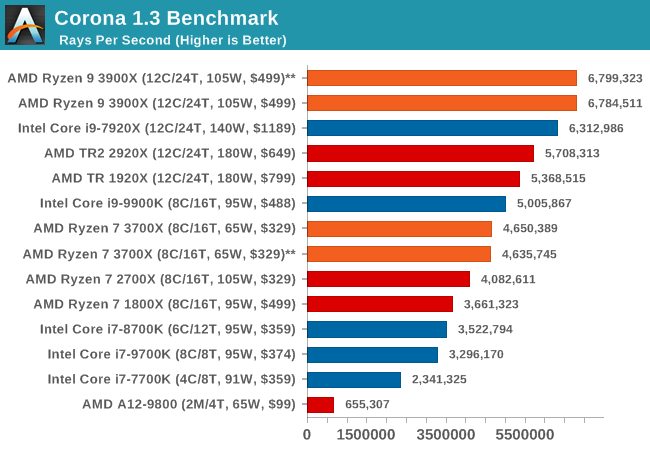
LuxMark v3.1: LuxRender via Different Code Paths
As stated at the top, there are many different ways to process rendering data: CPU, GPU, Accelerator, and others. On top of that, there are many frameworks and APIs in which to program, depending on how the software will be used. LuxMark, a benchmark developed using the LuxRender engine, offers several different scenes and APIs.
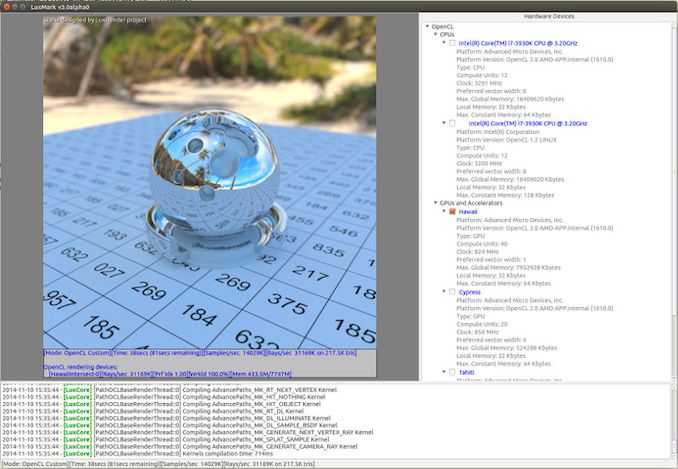
Taken from the Linux Version of LuxMark
In our test, we run the simple ‘Ball’ scene on both the C++ and OpenCL code paths, but in CPU mode. This scene starts with a rough render and slowly improves the quality over two minutes, giving a final result in what is essentially an average ‘kilorays per second’.
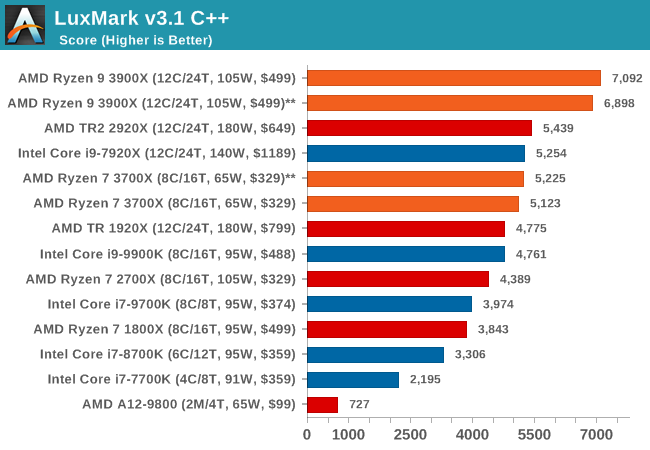
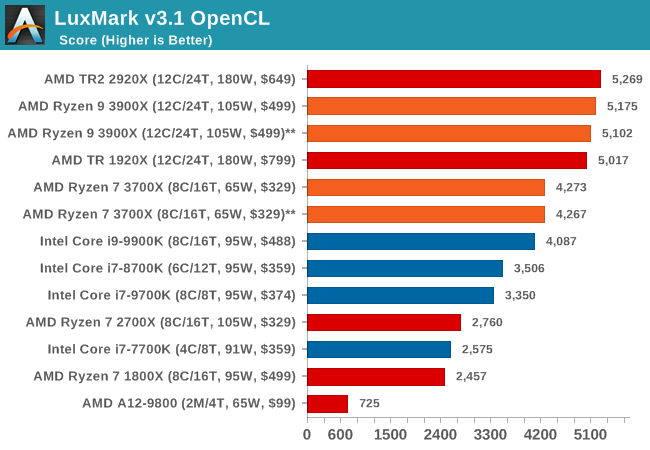
POV-Ray 3.7.1: Ray Tracing
The Persistence of Vision ray tracing engine is another well-known benchmarking tool, which was in a state of relative hibernation until AMD released its Zen processors, to which suddenly both Intel and AMD were submitting code to the main branch of the open source project. For our test, we use the built-in benchmark for all-cores, called from the command line.
POV-Ray can be downloaded from http://www.povray.org/
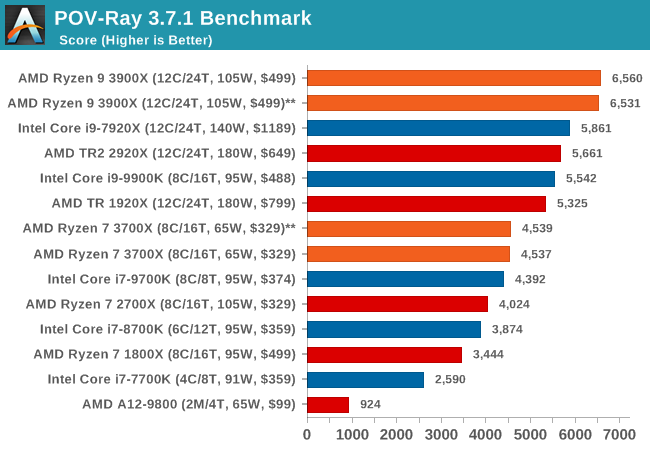
Cinebench R15
The latest version of CineBench has also become one of those 'used everywhere' benchmarks, particularly as an indicator of single thread performance. High IPC and high frequency gives performance in ST, whereas having good scaling and many cores is where the MT test wins out.
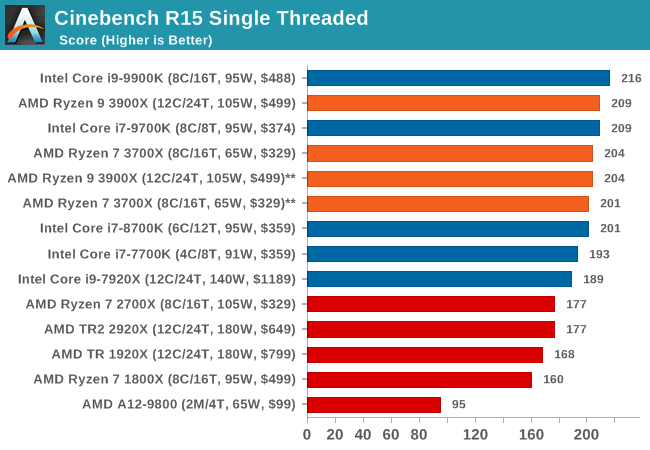
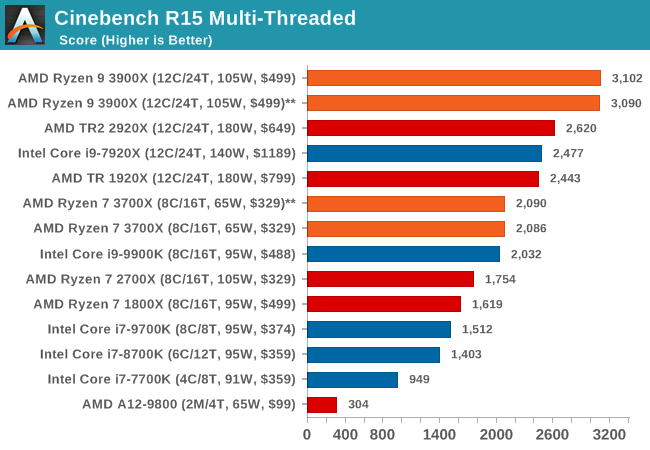


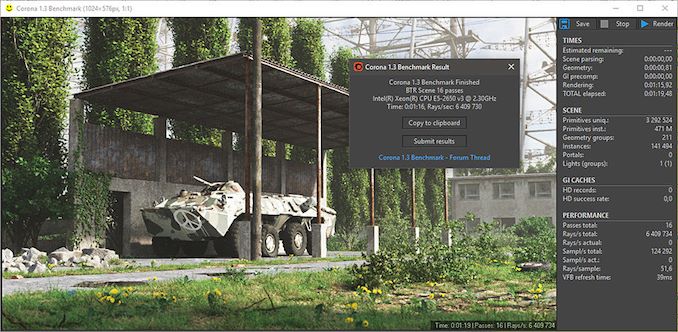








447 Comments
View All Comments
Korguz - Tuesday, July 9, 2019 - link
there is NO fraud about this.. better yet... where is your PROOF about this ? post some links to sites that are showing this.. if not drop it already.. you are just trying to spread lies, and BS...Maxiking - Tuesday, July 9, 2019 - link
My proof is this and any review on the internet, the advertised 4.6ghz is not being reached on the majority chips and if, only for 100 - 200ms and very sporadically. This is called FRAUD, I guess Intel should start selling their cpus with 5.3ghz boost because a few of them would be able to reach it for 100ms after pumping a lot of voltage into them like AMD does.PACougar - Tuesday, July 9, 2019 - link
Lol, a boost frequency is exactly that. It doesn't mean the chips will sustain the boost for any guaranteed period of time. Do you really think it's just a coincidence that you're the only one that's "outraged" by the expected operation of these chips? Guess what, when Intel ships a chip with a stated frequency, it's also a boost with no guarantee of duration. Stock 9900k's don't run continuously at 5ghz. Lol You look like a complete fool for talking about fraud where there is none.Korguz - Tuesday, July 9, 2019 - link
yea ok sure.. what ever maxiking.. you have NO idea how boost works, OR what the difference is between boost and max all core turbo is. the fact you wont post links to other sites that show this, also proves your are just trying to spread lies and BS. the only fraud i am seeing.. is you...Maxiking - Tuesday, July 9, 2019 - link
We are on the side which confirms my words in the review, forums, by their tweets. Yet you are blind to the facts. Check derbauer, gaming nexus, not gonna spoonfeeding you.Korguz - Tuesday, July 9, 2019 - link
let me ask you this... maxiking.. do you know the difference between boost clock. and all core turbo ? cause it sure seems you do NOT know the difference.. and others have pointed out to you that you are also wrong.. i wanted links.. to be sure i am looking at the same sites as you.. in the end.. you are just trolling.. and talking bs... drop this already..Qasar - Wednesday, July 10, 2019 - link
Check derbauer, gaming nexus... never heard of these sites.. i can see why Korguz is asking you to post links directly to where you are getting this, and i agree, BS from...Maxiking - Tuesday, July 9, 2019 - link
There is a debate going about this on every internet forum, so no I am not the only one concerned and the AMD subreddit has a dedicated thread about it as well.If Intel ships a chip with any stated boost frequency, the boosts are guaranteed on the per core usage basis. Stock 9900k runs at 5.0 ghz, the more cores are being used, the lower frequency..a single core always run @ 5.0ghz, all cores @ 4.7ghz. I already said it earlier. Sorry my friend, wrong example, the only fool here is you.
The fact is that Ryzen 3rd gen is a worse overclocker than the 2nd one. Or you know, I will give AMD the benefit of doubt. Before the reviews were up, the whole internet had been going crazy and thinking that 4.6 on all cores was possible, because "look at those boost frequency man". And that was the AMD intention. To use those sporadical 100 - 200ms spikes to spread the idea that the final product would able to reach them on all cores, to misguide. And I must say it WORKED brilliantly, ADOREDTV is now the biggest clown on the internet, easy 5ghz+, he said. I wonder if he makes ConLake style videos about this.
So yeah, that 4.6ghz boost is fraud. The majority can't reach it on a single core and the rest capable of doing so only by performing non frequent 100 - 200ms long spikes.
If Intel did this, oh god, what a shitstorm would be here, just like with their TDP, Meltdown, Spectre. Every review would be full of this. Don't blame me, I am just pointing at facts and making fun of petty suddenly blind amd fans. Don't shoot the messenger.
Korguz - Tuesday, July 9, 2019 - link
well.. 1st.. you didnt answer my question if you know the difference between boost clock and all core turbo.. 2nd.. you are the only one on here.. that is crying about this.. define every internet forum... also.. you do not seem to replying to any one else in this thread about this..Targon - Monday, July 22, 2019 - link
I've seen 4.4GHz without doing any BIOS tweaking on a 3900X on an Asus ROG Crosshair VI Hero. BIOS is still AGESA 1.0.0.2, so I haven't bothered to even try pushing to 4.6GHz yet. I wouldn't say that a boost to 4.6GHz with a good BIOS version isn't possible based on what I have seen with X370, and expecting that X570 has a good chance to be better about how to handle the new chips.As far as Intel and boost speeds, that is based as well on cooling. You try a 95W TDP rated cooler, and you will NOT be hitting anywhere close to 5.0GHz boost. You would need something significant. That 95W TDP is a fraud, because it only applies to base speeds, while the AMD TDP figures are in line with what most people will hit.